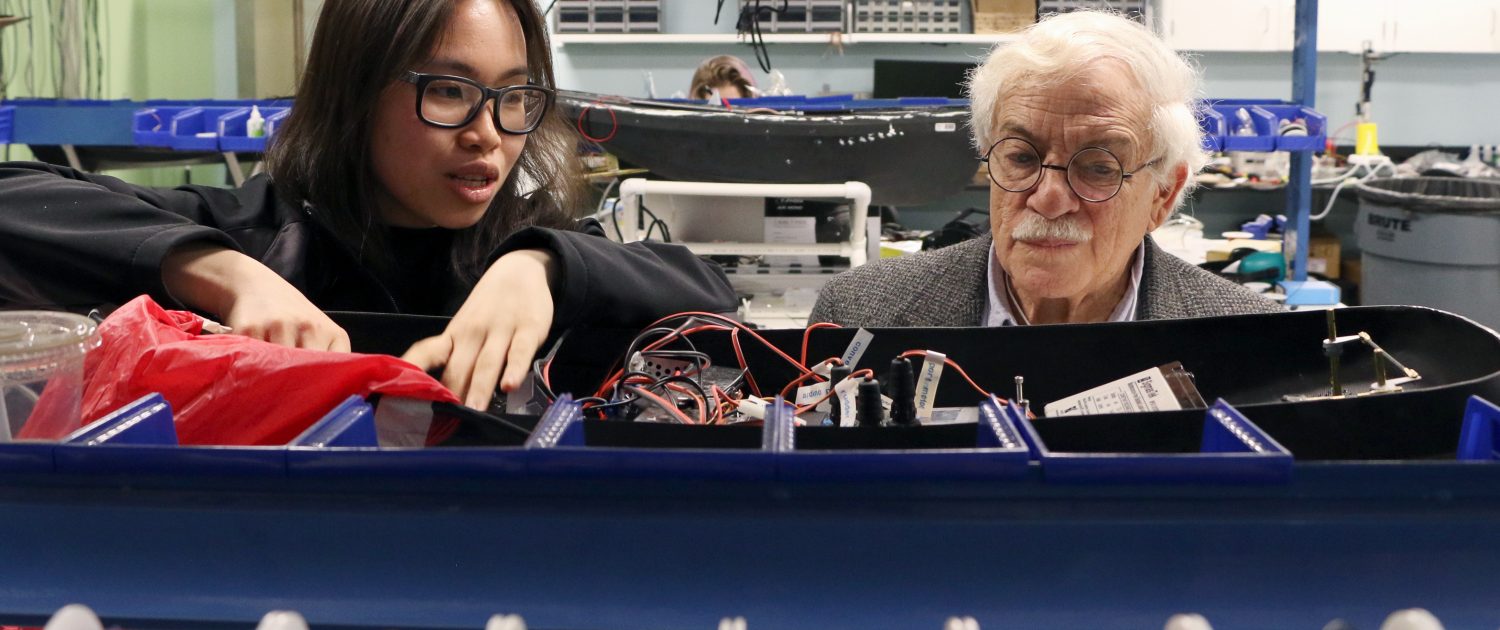Qingmei (May) Wu wins the Dean A. Horn Award for Undergraduate Study in Marine Research
 Photo: May Wu looks inside of a remotely operated boat with “The Father of Side Scan Sonar” Marty Klein.
Photo: May Wu looks inside of a remotely operated boat with “The Father of Side Scan Sonar” Marty Klein.
MIT Sea Grant announces the winner of the 2020 Dean A. Horn Award for Undergraduate Study in Marine Research. This year’s award goes to Qingmei (May) Wu, a graduating senior in the MIT Mechanical Engineering Department for her work on the thermal management of electric ships. Her senior thesis titled, Evaluating a Multi-jet Impingement Air Heat Exchanger Design for PEBB 6000 using Solidworks Flow Simulation inspired her supervisor Dr. Thomas Consi to nominate her for the award.
About the Award
Dean A. Horn was Director of MIT Sea Grant from 1975 to 1982. The Award originated upon his retirement in 1983, established by friends and colleagues to honor his ideals: service, creativity, pursuit of excellence and tireless application to research. An award of $1000 is presented yearly to selected MIT undergraduate students from any academic department for creative marine-related projects and resulting papers. >>Read more
Qingmei (May) Wu
Wu started at the MIT Sea Grant Teaching Laboratory as part of MIT’s Undergraduate Research Opportunities Program (UROP) in the summer of 2019. Her work focused on design, construction, and experimentation to increase the thermal coupling efficiency between two heat pipes and pointed to a research direction to improve the efficiency of the coupling. Her impressive performance led to Dr. Consi and former Director Prof. Chrys Chryssostomidis recruiting her to do her undergraduate thesis in the MIT Sea Grant lab.
Wu’s work explored a novel method of air-cooling the Power Electronic Building Block (PEBB) 6000 used by the US Navy. Normal air-cooling methods are insufficient. Using SolidWorks, Wu explored using a multi-jet system to increase efficiency through analyzing the heat transfer characteristics of air jet impingement, and then creating a computer model of a complete jet impingement heat sink system. She found this design improved the heat transfer rate over convectively cooled heat sinks by a factor of about three.
Dr. Consi describes Wu’s accomplishments:
“May took a ‘back of the envelope’ idea and developed the analytic tools with which she proved the concept, explored the design space, and set the stage for further development – an impressive piece of work for an undergraduate. May’s work in the area of thermal management of naval ships, and her outstanding work ethic, will honor the memory of Dean Horn who was both a naval officer and an MIT-trained engineer.”



